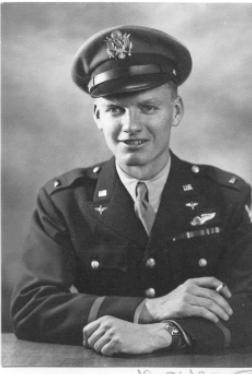|

 4. The farm 4. The farm
After pedaling for about twenty minutes, we turned off the road and entered a farmyard (1). A dog ran after us and barked. As we dismounted, the farmer came out of the house. The farmer and the youth talked excitedly, and then hurried me to the barn. I climbed up the ladder after them into the hay loft. The three of us sat down on the floor and I suddenly felt very tired.
I tried to thank my new-found friends. They were more interested in how our airplane had been shot down. By using gestures, I was able to convey the story to them. I had a package of cigarettes in my shirt pocket, which I passed around. There was a long conversation between the Frenchmen about American cigarettes as they inhaled deeply. Later in the afternoon, the farmer went to the house. When he returned he was carrying a small loaf of dark brown bread, a bottle of wine and glasses.
I washed the bread down with wine. We finished the bottle as dusk fell. Later my friends climbed down the ladder and I lay down. I was soon sleeping soundly on the soft fragrant hay.
Dawn was breaking and a rooster was crowing when I awoke. I was covered with a U.S. Army blanket. The farmer appeared, carrying fried ham and an omelet in an iron skillet and a bowl of hot milk. I tried to sit up and found that I couldn't. By rolling over on my stomach, I was able to push my body up, get on my knees and finally sit.
When I had finished eating, he showed me the words "U.S. Army" on the bottom of the skillet. He had fought with the United States soldiers in World War I.
The farmer indicated that German patrols would be searching the countryside for me. He led me to a briar thicket some distance from the barn. I crawled into the thicket and waited for the day to pass. About ten o'clock a truck drove into the farmyard, and I could hear voices. The truck left in about fifteen minutes. That evening, I learned that the truck was driven by German soldiers. The farmer had no knowledge of any American and the soldiers had left after a cursory search.
I spent the next two days in the thicket during the day and returned to the barn at night. A number of Frenchmen came during the evenings to see the American and discuss my plight. They paused frequently to curse les Allemands and pour more wine to toast the coming German defeat. The French, apparently, disliked water and never drank it when wine was available. Their wine was light and tasted good and seemed to be plentiful. Late in the second night, it was decided that I should be moved the next day. It was dangerous to stay too long in one place.
 (1) Marcel Biret's farm in hamlet of Loterie in Saint-Philbert-de-Grandlieu
(1) Marcel Biret's farm in hamlet of Loterie in Saint-Philbert-de-Grandlieu
[Top] [Next]
|
|

